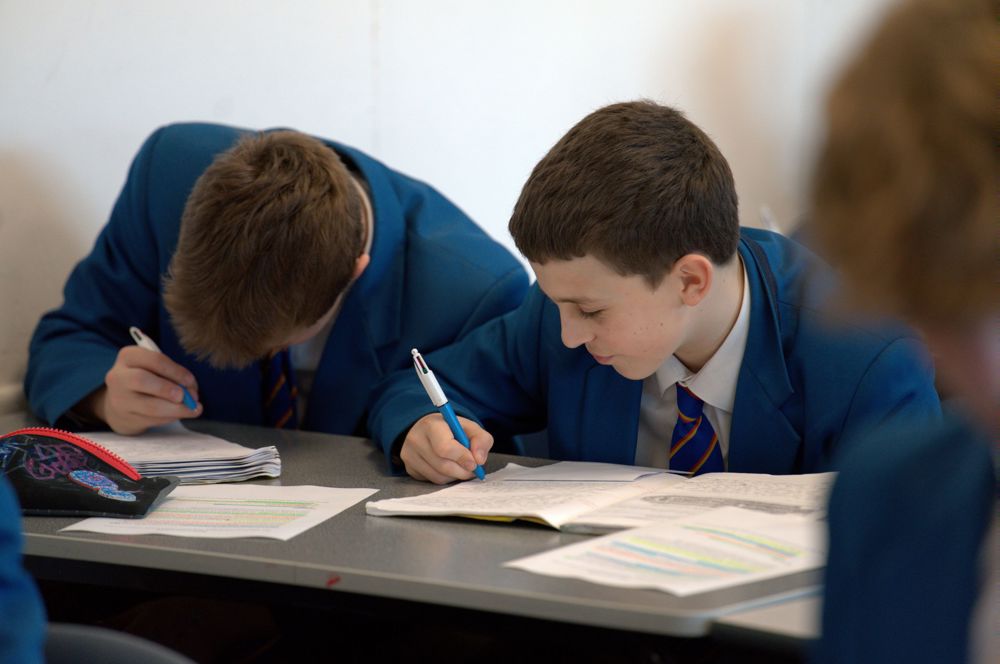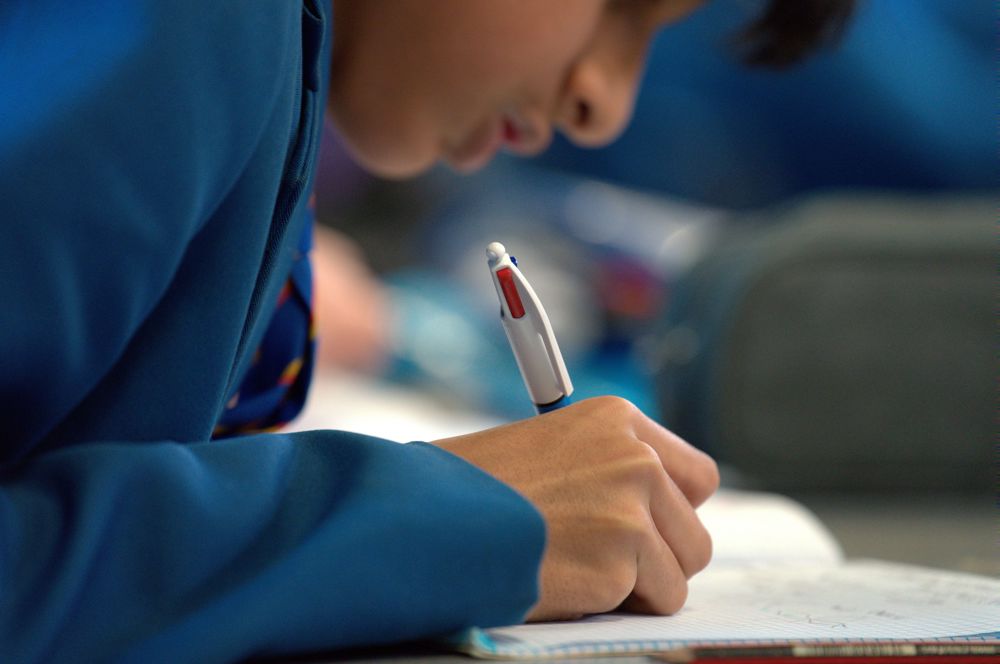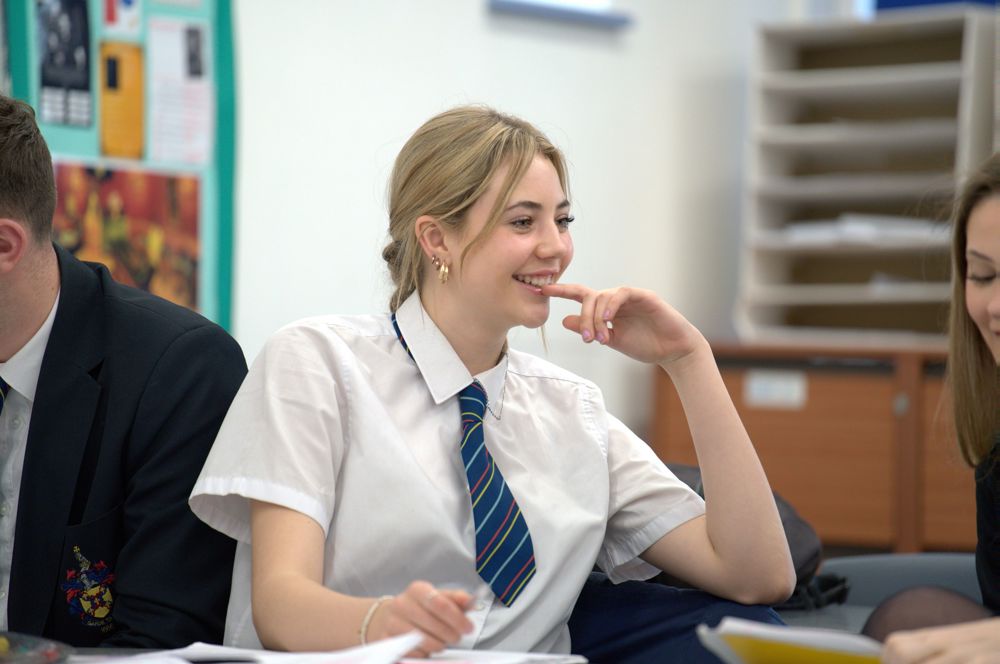
Philosophy & Theology
Philosophy and Theology explores some of the most important debates and ideas from throughout history. Our expert teachers develop learners' abilities to reason, argue and persuade; the curriculum explores faith, tolerance and belief systems, and students probe the 'big' questions of life in a spirit of true intellectual enquiry.
Religious Studies is part of the Key Stage 3 curriculum, and pupils are encouraged to explore key questions from a range of different religious perspectives and non-religious world views, in order to gain a greater understanding of the reason for beliefs and the way in which they impact on the lives of individuals and communities. RS remains compulsory in Key Stage 4, with students taking a short-course GCSE in RS unless they have chosen the full course RS GCSE as an option. A qualification in RS enables pupils to gain critical, evaluative skills which will equip them for higher education and the world of work. They will also gain a greater understanding of the way in which belief informs practice, as well as evaluating the place of religious belief in the modern world.
Pupils can choose to study Philosophy at A Level, and learners have the opportunity to extend their core knowledge and understanding by exploring some of the most profound questions that can be asked, such as what is knowledge, and is the mind the same as the brain?
Curriculum Map

Key Stage 3
Students are taught for three periods of RS a fortnight, following the Gloucestershire Agreed Syllabus in Years 7 and 8, and starting the GCSE in Religious Studies in Year 9. Homework assignments are set once a week and comprise research tasks, completing work started in the classroom and revising for assessments. Year 9 pupils also begin to practise examination style answers. There is one assessment per unit of study.
Year 7
Founders of religion. Is there a God? Was Jesus God on Earth? Do the Buddha’s teachings stand the test of time?
Year 8
Why is there suffering? What do we do when life gets hard? How do we express spirituality? What can we learn from Sikhism? Is there life after death?
Year 9
Good bad, how do I decide? Sources of authority in Christianity and Islam (AQA GCSE). Theme: peace and conflict (AQA GCSE).

Key Stage 4
Students following the short course RS GCSE are taught for three periods a fortnight in Year 10. Those who take full course GCSE take Religious Studies as one of their option choices and have lessons for five periods a fortnight in Years 10 and 11. Homework is set weekly and tasks include preparing for the next lesson and practice examination questions. Short-course students sit one final examination paper of 1 hour and 45 minutes at the end of Year 10. Full-course students sit two written examination papers of 1 hour 45 minutes each at the end of Year 11.
Year 10 short course
Beliefs in Christianity (AQA GCSE). Revision, beliefs in Islam and exam practice. Themes: Relationships (AQA GCSE). Revision, peace and conflict.
Year 10 full course
Beliefs in Christianity (AQA GCSE). Practices in Christianity (AQA GCSE). Religion and life (AQA GCSE). The existence of God and revelation (AQA GCSE). Relationships (AQA GCSE).
Year 11 full course only
Relationships (AQA GCSE). Practices in Islam (AQA GCSE). Practices in Christianity (AQA GCSE). Revision beliefs in Islam and Christianity. Revision of themes and exam practice.

Key Stage 5
RS students follow the OCR A Level specification and are taught for nine periods a fortnight. Assessment is by three, two-hour papers sat at the end of Year 13: Philosophy of Religion. Religion and Ethics. Development in Christian Thought. Students write three essays for each paper, from a choice of four.
Philosophy students follow the AQA A Level specification for nine periods a fortnight, the components of which are: Epistemology, Moral Philosophy, Metaphysics of God, Metaphysics of Mind. Assessment is by two three-hour papers sat at the end of Year 13.
In both subjects pupils are expected to take increased responsibility for independent learning, and go over class notes after each lesson, supplementing their study with readings from the textbooks and other recommended books and journals. They will need to read widely in preparation for essays for each topic, which will be set as either timed essays completed in class, or written in their own time. They may also be asked to contribute their research in the form of a presentation to the class.
Entry requirement
RS: Grade 6 GCSE English Language. Philosophy: Grade 7 GCSE English Language or 7 in Mathematics.
Year 12 Religious Studies
Philosophy of religion: Ancient philosophical influences. Arguments for the existence of God. The challenges for religious belief. The nature of the soul, mind and body. Religion and ethics: Religious ethical theories. The application of ethical theory to two contemporary issues of importance. Development in Christian thought. Human nature. Death and the afterlife. Knowledge of God. The person of Jesus Christ. Christian moral principle and action.
Year 13 Religious Studies
Philosophy of religion: Ideas about the nature of God. The nature and impact of religious experience. Issues in religious language. Religion and ethics: Ethical language and thought. Conscience. Sexual ethics. Development in Christian thought: Religious pluralism. Religion and gender. The challenge of secularism. Liberation theology and Marx.
Year 12 Philosophy
Epistemology: What is knowledge? Perception as a source of knowledge. Reason as a source of knowledge. The limits of knowledge.
Moral Philosophy: Utilitarianism. Kantian ethics. Virtue ethics. Applied ethics. Meta-ethics.
Year 13 Philosophy
Metaphysics of God: The concept and nature of God. Arguments relating to the existence of God. Religious language.
Metaphysics of Mind: What do we mean by mind? Dualism. Physicalism. Functionalism.
Enrichment
The Department arranges a variety of trips and visiting speakers designed to support learning in the classroom, as well as contributing to the timetabled Sixth Form Enrichment Programme.
Head of Philosophy & Theology
Dr Kyle Scott kis@strs.org.uk